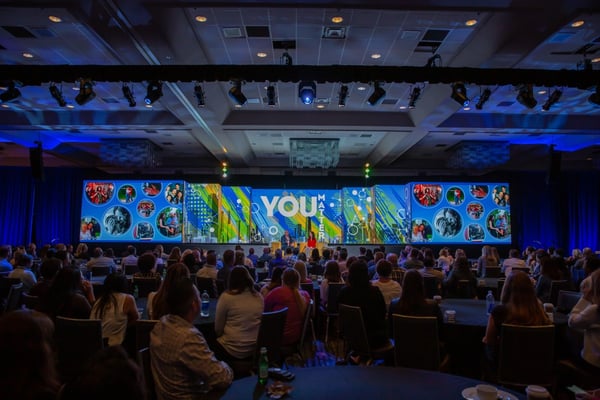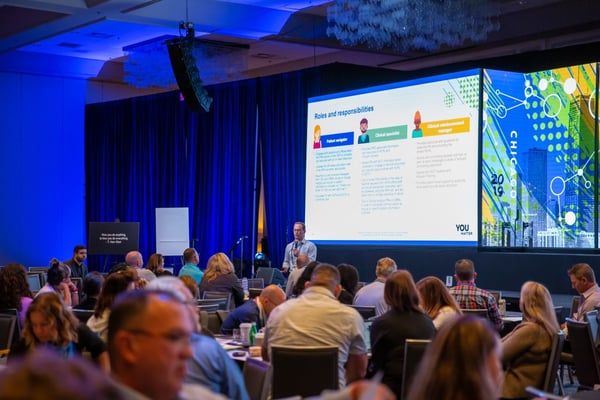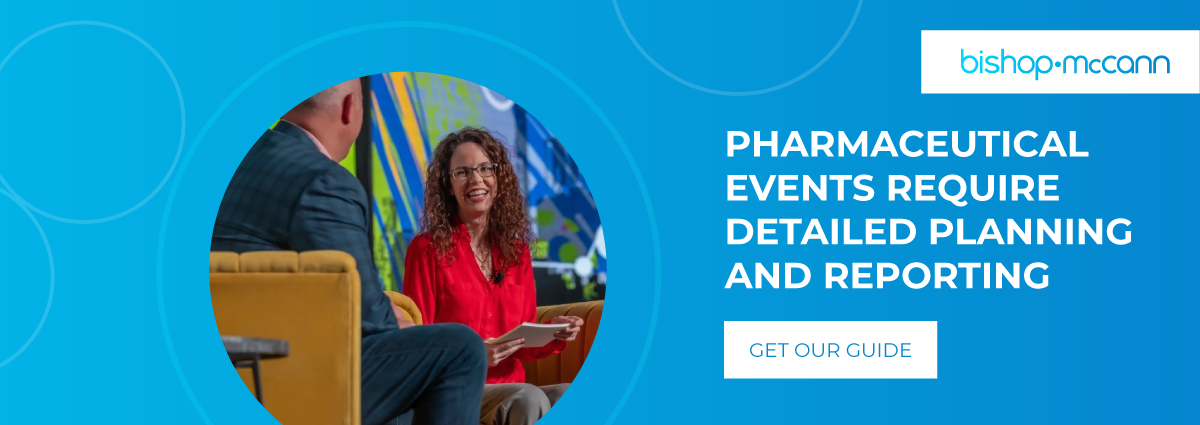 From the outside, a meeting looks like a meeting. People in suits or business casual filtering from room to room, attending sessions, networking over coffee, and congregating for meals to discuss the day’s events. Yet, well-executed meetings (especially for the pharmaceutical industry) are like ducks. On the surface, smooth swimming but below the surface, there are two feet kicking and paddling to make that all happen. Those two feet? Event planners. Choosing the right event planner for a pharmaceutical event means finding an event planning team with not just experience but expertise in the industry.
From the outside, a meeting looks like a meeting. People in suits or business casual filtering from room to room, attending sessions, networking over coffee, and congregating for meals to discuss the day’s events. Yet, well-executed meetings (especially for the pharmaceutical industry) are like ducks. On the surface, smooth swimming but below the surface, there are two feet kicking and paddling to make that all happen. Those two feet? Event planners. Choosing the right event planner for a pharmaceutical event means finding an event planning team with not just experience but expertise in the industry.
Quick Links
- Why Pharma Meetings Are Different
- What Event Planners Need to Understand About the Pharmaceutical Industry
- Special Considerations Needed for Pharmaceutical Meetings
- How Event Planners Help Pharmaceutical Companies Hold Successful Meetings
Why Pharma Meetings Are Different
From the outside, many pharmaceutical meetings look like any other corporate meeting. The trappings are the same; however, there are a few important aspects that differ that must be considered and carefully managed for pharmaceutical events.
Because the industry is heavily regulated and values both transparency as well as the public perception of ethical considerations, it adheres strictly to the Open Payments Program. This requires both medical device and pharmaceutical companies to record and track their interactions with healthcare providers (HCPs). As a result, any pharmaceutical meeting that involves even one HCP must adhere to these rules, which are constantly evolving and incredibly variable depending upon the HCP’s state or country of residence/employment.
In order to meet these needs, pharmaceutical companies and their event managers have to ensure they’re working with event planning companies that are well-versed in these regulations and have a record of tracking and communicating regulatory reporting.
 What Event Planners Need to Understand About the Pharmaceutical Industry
What Event Planners Need to Understand About the Pharmaceutical Industry
HCP attendance is certainly among the most important aspects of pharmaceutical meetings and events. Further, it’s worth noting that though there are different kinds of pharma meetings, HCP attendance at any of those events requires the same attention to detail and adherence to regulatory requirements. That said, let’s dig into the differences.
Types of Pharmaceutical Meetings
Even within the pharmaceutical industry, there are different kinds of meetings. That’s one reason why utilizing event planners who have significant experience in not just event planning but also in this particular industry is crucial. Meetings can range from small groups to hundreds in attendance, so an event planning agency must be able to scale to meet those needs.
Investigator Meetings - These meetings occur during the clinical trial phase and are composed of individuals from the pharma company, as well as the HCPs who are conducting trials. Through the trial phases, these meetings grow significantly in size.
Advisory Meetings - These meetings occur to discuss the status of pharmaceutical products and often involve key opinion leaders (KOLs). These advisory meetings may include a mix of both internal teams and HCPs, so despite their smaller size, they must also be carefully monitored and managed.
Launch Meetings - These internal meetings occur once a pharmaceutical product is ready to be released and are typically more celebratory than other types of pharma meetings. They include sales, marketing, and others engaged in the commercial side of the business. Additionally, these kinds of meetings are designed to help them understand how to best position the product while celebrating the launch.
National Field Meetings (NFM) - Similar to launch meetings, these are internal, but may also include invites to a small number of HCPs. Among the largest of the pharmaceutical meetings, for Bishop-McCann, these can involve over 20 program and event managers, as well as up to 300 staff members to handle the significant number of attendees. Additionally, it’s worth noting that at events like these, HCPs in attendance must be accompanied by event staff. From registration to movement throughout the event, they are often escorted by a team member to ensure compliance with Open Payment Program requirements. This means HCPs may have a different event experience, so companies are able to record and track all transfers of valued goods.
Special Considerations Needed for Pharmaceutical Meetings
At this point, it’s probably pretty clear that one of the primary special considerations for pharmaceutical meetings is who is in attendance, along with backend reporting. In addition to that, the size of the event matters.
In order to accommodate the needs of HCPs and adhere to variable regulatory rules regarding what they can and cannot accept, working with venues and vendors who are experienced in managing and negotiating these costs is also essential. When you choose an event planning agency that has this experience, you also gain access to their established relationships with vendors and venues familiar with the pharmaceutical industry.
Additionally, for many companies investing millions in the research and development of new pharmaceutical products, there are significant concerns regarding access control and secure space that significantly limit access as well as provide privacy. Again, choosing an established and experienced event planning agency, especially one that has a long history of working with the pharmaceutical industry, can make all the difference in addressing concerns and significantly reducing stress.
 How Event Planners Help Pharmaceutical Companies Hold Successful Meetings
How Event Planners Help Pharmaceutical Companies Hold Successful Meetings
Corporate events are no easy undertaking. There are many moving parts involved in every stage of the event, from proper planning to live event production and execution. That doesn’t even include managing the logistics of travel and venues, and when working in the pharmaceutical sector, you often have to create two different event tracks when HCPs are involved.
While many large pharmaceutical companies have event staff, given the prevalence of events within the industry, it’s easy to see why in-house event managers can easily be overwhelmed. Managing transfer-of-value issues and staying on top of those requirements and their reporting is a full-time job.
A successful event requires negotiating, problem-solving, preparation, setup, technology, and venue logistics. On top of that, there’s handling registration, assisting attendees, and ensuring everyone has what they need. For launch events, this often includes off-site activities, entertainment, and parties over multiple days. In short, it’s no easy feat to pull off a successful pharmaceutical event.
That’s why Bishop-McCann is here. Our roots are based in the pharmaceutical industry, so we have a long history of helping plan, prepare, and stage pharmaceutical meetings of all kinds. We’re familiar with the unique needs and considerations of the industry, and we’re looking forward to working with you. If you’re ready to talk about how we can help with your next event, get in touch with our team today!
